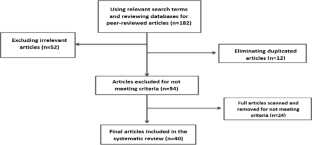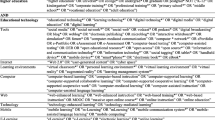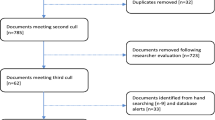Abstract
Action research studies in education often address learners’ needs and empower practitioners to effectively change instructional practices and school communities. A systematic review of action research (AR) studies undertaken in EFL/ESL setting was conducted in this paper to systematically analyze empirical studies on action research published within a ten-year period (between 2010 and 2019). The review also aimed at investigating the focal themes in teaching the language skills at school level and evaluating the overall quality of AR studies concerning purpose, participants, and methodology. Inclusion criteria were established and 40 studies that fit were finally selected for the systematic review. Garrard’s (2007) Matrix Method was used to structure and synthesize the literature. Results showed a significant diversity in teaching the language skills and implementation of the AR model. Moreover, findings revealed that (50%) of the studies used a mixed-method approach followed by a qualitative method (37.5%); whereas only (12.5%) employed quantitative methodology. Research gaps for future action research in developing language skills were highlighted and recommendations were offered.


Similar content being viewed by others
References
Abdallah MS (2016) Towards improving content and instruction of the ‘TESOL/TEFL for special needs’ course: an action research study. Educ Action Res 25(3):420–437. https://doi.org/10.1080/09650792.2016.1173567
Ahmad S (2012) Pedagogical action research projects to improve the teaching skills of Egyptian EFL student teachers. Proceedings of the ICERI2012, 5th International Conference of Education, Research and Innovation (PP.3589-3598). Madrid: Spain
Ahn H (2012) Teaching writing skills based on a genre approach to L2 primary school students: an action research. Engl Lang Teach 5(2):2–16
Ainscow M, Booth T, Dyson A (2004) Understanding and developing inclusive practices in schools: a collaborative action research network. Int J Incl Educ 8(2):125–139. https://doi.org/10.1080/1360311032000158015
Allwright D, Bailey KM (1991) Focus on the language classroom: an introduction to classroom research for language teachers. Cambridge University Press, Cambridge
Alsowat H (2017) A systematic review of research on teaching English language skills for Saudi EFL students. Adv Lang Lit Stud 8(5):30–45
Alvarez CLF (2014) Selective use of the mother tongue to enhance students’ English learning processes…beyond the same assumptions. PROFILE Issues Teach Prof Dev 16(1):137–151. https://doi.org/10.15446/profile.v16n1.38661
Arteaga-Lara HM (2017) Using the process-genre approach to improve fourth-grade EFL learners’ paragraph writing. Lat Am J Content Lang Integr Learn 10(2):217–244. https://doi.org/10.5294/laclil.2017.10.2.3
Bethany-Saltikov J (2012) How to do a systematic literature review in nursing: a step-by-step guide. Open University Press, Maidenhead
Burns A (2010) Doing action research in English language teaching: a guide for practitioners. Routledge, New York, p 196 ISBN 978-0-415-99145-2
Campbell E, Cuba M (2015) Analyzing the role of visual cues in developing prediction-making skills of third- and ninth-grade English language learners. CATESOL J 27(1):53–93
Campbell YC, Filimon C (2018) Supporting the argumentative writing of students in linguistically diverse classrooms: an action research study. RMLE Online 41(1):1–10. https://doi.org/10.1080/19404476.2017.1402408
Carolina B, Astrid R (2018) Speaking activities to foster students’ oral performance at a public school. Engl Lang Teach 11(8):65–72
Carr W, Kemmis S (1986) Becoming critical: education. knowledge and action research. Falmer, London
Cerón CN (2014) The effect of story read-alouds on children’s foreign language development. Gist Educ Learn Res J 8:83–98
Chaves O, Fernandez A (2016) A didactic proposal for EFL in a public school in Cali. HOW 23(1):10–29. https://doi.org/10.19183/how.23.1.139
Chen S, Huang F, Zeng W (2018) Comments on systematic methodologies of action research in the new millennium: a review of publications 2000–2014. Action Res 16(4):341–360. https://doi.org/10.1177/1476750317691103
Cho Y, Egan TM (2009) Action learning research: a systematic review and conceptual framework. Hum Resour Dev Rev 8(4):431–462 SAGE Publications
Cochrane TD (2014) Critical success factors for transforming pedagogy with mobile web 2.0. Br J Educ Technol 45(1):65–82. https://doi.org/10.1111/j.1467-8535.2012.01384.x
Cooper K, White RE (2012) Qualitative research in the postmodern era: contexts of qualitative research. Springer, Dordrecht
Dewi R, Kultsum U, Armadi A (2017) Using communicative games in improving students’ speaking skills. Engl Lang Teach 10(1):63–71
El-Deghaidy H (2012) Education for sustainable development: experiences from action research with science teachers. Discourse Commun Sustain Educ 3(1):23–40
Elliott J (1991) Action research for educational change. Open University Press, Milton Keynes
Fahrurrozi (2017) Improving students’ vocabulary mastery by using Total physical response. Engl Lang Teach 10(3):118–127. https://doi.org/10.5539/elt.v10n3p118
Fischer JC (2001) Action research, rationale and planning: developing a framework for teacher inquiry. In: Burnaford G, Fischer J, Hobson D (eds) Teachers doing research: The power of action through inquiry, 2nd edn. Lawrence Erlbaum Associates, Mahwah, pp 29–48
Fullerton S, Clemson A, Robson K (2015) Using a scaffolded multi-component intervention to support the reading and writing development of English learners. i.e. Inq Educ 7(1):1–20 http://digitalcommons.nl.edu/cgi/viewcontent.cgi?article=1104&context=ie
Gámez DY, Cuellar JA (2019) The use of Plotagon to enhance the English writing skill in secondary school students. Profile Issues Teach Prof Dev 21(1):139–153. https://doi.org/10.15446/profile.v21n1.71721
Garrard J (2007) Health sciences literature review made easy: the matrix method. Jones and Bartlett Publishers, Sudbury
Greenwood DJ, Levin M (1998) Introduction to action research: social research for social change. Sage, Thousand Oaks
Gutiérrez KG, Puello MN, Galvis LA (2015) Using pictures series technique to enhance narrative writing among ninth grade students at Institución Educativa Simón Araujo. Engl Lang Teach 8(5):45–71
Halwani N (2017) Visual aids and multimedia in second language acquisition. Engl Lang Teach 10(6):53–59
Hamilton C (2018) The Effects of peer-revision on student writing performance in a middle school ELA classroom (doctoral dissertation). University of South Carolina. ProQuest: Retrieved from https://scholarcommons.sc.edu/etd/4596
Han L (2017) Analysis of the problems in language teachers’ action research. Int Educ Stud 10(11):123–128
Jaime-Osorio MF, Caicedo-Muñoz MC, Trujillo-Bohórquez IC (2019) A radio program: a strategy to develop students’ speaking and citizenship skills. HOW 26(1):8–33. https://doi.org/10.19183/how.26.1.470
Jones-Jackson B (2015) Supplemental Literacy Instruction: Examining its effects on student learning and achievement outcomes: An action research study (doctoral dissertation). Capella University, ProQuest: Retrieved from https://eric.ed.gov/?id=ED558987
Juriah J (2015) Implementing controlled composition to improve vocabulary mastery of EFL students. Dinamika Ilmu 15(1):137–162
Kemmis S, McTaggert R (1998) The action research planner. Deakin University Press, Geelong
Kostandy M (2013) Teachers as agents of change: A case study of action research for school improvement in Egypt (unpublished Master’s thesis). American University in Cairo, Graduate School of Education, Cairo, Egypt
Lan Y-J (2015) Action research contextual EFL learning in a 3D virtual environment. Lang Learn Technol 19(2):16–31
Lavalle PI, Briesmaster M (2017) The study of the use of picture descriptions in enhancing communication skills among the 8th-grade students—learners of English as a foreign language. I.e. Inq Educ 9(1):1–16 Article 4
Lee MW (2018) Translation revisited for low-proficiency EFL writers. ELT J 72(4):365–373
Madriñan MS (2014) The use of first language in the second-language classroom: a support for second language acquisition. Gist Educ Learn Res J 9:50–66
Marenco-Domínguez JM (2017) Peer-tutoring fosters spoken fluency in computer-mediated tasks. Lat Am J Content Lang Integr Learn 10(2):271–296. https://doi.org/10.5294/laclil.2017.10.2.5
McNiff J, Whitehead J (2006) All you need to know about action research. SAGE Publications, London
Mertler CA (2014) Action research: improving schools and empowering educators (4th ed). SAGE, Thousand Oaks
Miles GE (2006) Action research: A guide for the teacher researcher, 3rd edn. Merrill Prentice Hall, Upper Saddle River
Montelongo J, Herter RJ, Ansaldo R, Hatter N (2010) A lesson cycle for teaching expository reading and writing. J Adolesc Adult Lit 53(8):656–666. https://doi.org/10.1598/JAAL.53.8.4
Murillo HA (2013) Adapting features from the SIOP component: lesson delivery to English lessons in a Colombian public school. PROFILE 15(1):171–193
Nair S, Sanai M (2018) Effects of utilizing the STAD method (cooperative learning approach) in enhancing students’ descriptive writing skills. International. J Educ Pract 6(4):239–252
Nasrollahi M, Krishnasamy PN, Noor N (2015) Process of implementing critical Reading strategies in an Iranian EFL classroom: an action research. Int Educ Stud 8(1):9–16
Niño F, Páez M (2018) Building writing skills in English in fifth graders: analysis of strategies based on literature and creativity. Engl Lang Teach 11(9):102–117
Nova J, Chavarro C, Córdoba A (2017) Educational videos: a didactic tool for strengthening English vocabulary through the development of affective learning in kids. Gist Educ Learn Res J 14:68–87
Nurhayati DA (2015) Improving students’ English pronunciation ability through go fish game and maze game. Dinamika Ilmu 15(2):215–233
Ortiz SM, Cuéllar MT (2018) Authentic tasks to foster oral production among English as a foreign language learners. HOW 25(1):51–68. https://doi.org/10.19183/how.25.1.362
Ortiz-Neira RA (2019) The impact of information gap activities on young EFL learners’ oral fluency. Profile: Issues Teach Prof Dev 21(2):113–125. https://doi.org/10.15446/profile.v21n2.73385
Samawiyah Z, Saifuddin M (2016) Phonetic symbols through audiolingual method to improve the students’ listening skill. DINAMIKA ILMU 16(1):35–46
Sánchez RA (2017) Reading comprehension course through a genre-oriented approach at a school in Colombia. HOW 24(2):35–62. https://doi.org/10.19183/how.24.2.331
Singh G, Hardaker G (2014) Barriers and enablers to adoption and diffusion of eLearning. Educ Train 56(2/3):105–121. https://doi.org/10.1108/ET-11-2012-0123
Snyder MJ (2012) Reconnecting with your passion: an action research study exploring humanities and professional nursing (doctoral dissertation). ProQuest LLC
Stern T (2014) What is good action research? Considerations about quality criteria. In: Stern T, Townsend A, Rauch F, Schuster A (eds) Action research, innovation and change: international perspectives across disciplines. Routledge, London
Szabo S (2010) Older children need phonemic awareness instruction, too. TESOL J 1(1):130–141
Torres AM, Rodríguez LF (2017) Increasing EFL learners’ oral production at a public school through project-based learning. Profile Issues Teach Prof Dev 19(2):57–71. https://doi.org/10.15446/profile.v19n2.59889
Townsend A (2013) Action research: the challenges of understanding and researching practice. Open University Press, Maidenhead Berkshire
Triviño PA (2016) Using cooperative learning to foster the development of adolescents’ English writing skills. Profile Issues Teach Prof Dev 18(1):21–38. https://doi.org/10.15446/profile.v18n1.53079
Urquijo J (2012) Improving oral performance through interactions flashcards (unpublished doctoral dissertation). Centro Colombo Americano, Colombia
Vasileiadou I, Makrina Z (2017) Using online computer games in the ELT classroom: a case study. Engl Lang Teach 10(12):134–150
Vaughan M (2019) The body of literature on action research in education. The Wiley handbook of action research in education, first edition. Edited by Craig a. Mertler, 53-74
Vaughan M, Burnaford G (2015) Action research in graduate teacher education: a review of the literature, 2005-2015. Educ Action Res 24:280–299
Wach A (2014) Action research and teacher development: MA students’ perspective. In Pawlak, Mirosław; Bielak, Jakub; Mystkowska-Wiertelak, Anna (eds.) Classroom-oriented Research. Achievements and Challenges. Heidelberg: Springer, 121–137
Westbrook J (2013) Reading as a hermeneutical Endeavour: whole-class approaches to teaching narrative with low-attaining adolescent readers. Literacy 47(1):42–49
Author information
Authors and Affiliations
Corresponding author
Additional information
Publisher’s Note
Springer Nature remains neutral with regard to jurisdictional claims in published maps and institutional affiliations.
Appendix
Appendix
Rights and permissions
About this article
Cite this article
Ali, A.D. Implementing Action Research in EFL/ESL Classrooms: a Systematic Review of Literature 2010–2019. Syst Pract Action Res 33, 341–362 (2020). https://doi.org/10.1007/s11213-020-09523-y
Published:
Issue Date:
DOI: https://doi.org/10.1007/s11213-020-09523-y




